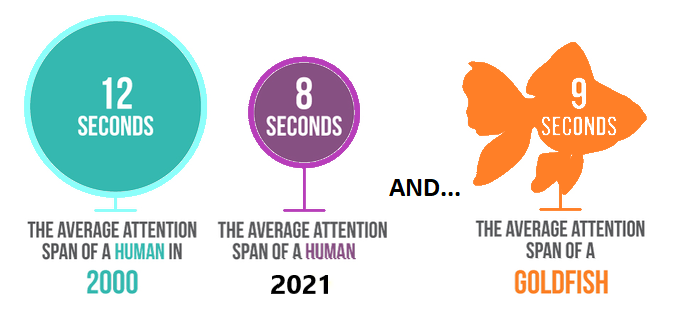Studies have shown that the average attention span has decreased from 12 seconds in 2000 to just 8 seconds in 2021. To put this in perspective, a goldfish has an attention span of 9 seconds.
More on this in Article …

We live in a world that is constantly bombarding us with information from all angles. From social media notifications to breaking news alerts, we are constantly stimulated and pulled in multiple directions, leaving us feeling overwhelmed and disoriented. Our ability to focus on a task or activity for an extended period has been greatly impacted by this constant barrage of stimuli. As a result, our attention spans have decreased dramatically, and this has significant consequences on our ability to cope with life.
This is the Attention Span Paradox: the more we are exposed to, the less attention we can give.
-Curiosity Trend
The Attention Span Paradox is not a new phenomenon. The term "continuous partial attention" was first coined by Linda Stone in 1998 to describe the constant state of distraction we find ourselves in. However, with the rise of social media and the internet, this phenomenon has become even more prevalent in our lives.

Attention span refers to the length of time that we can focus our attention on a particular task or activity. Studies have shown that the average attention span has decreased from 12 seconds in 2000 to just 8 seconds in 2021. To put this in perspective, a goldfish has an attention span of 9 seconds. This means that we are constantly looking for new stimuli to keep us engaged, leading to a lack of focus and attention in our daily lives. This also means that we are less able to stay focused and engaged, which can impact our ability to learn, make decisions, and cope with stress.
So why has our attention span decreased so dramatically? There are a number of factors at play, including the rise of digital technology, increased stress levels, and changes in our environment.
One of the biggest culprits is our addiction to digital devices. We spend an average of 3 hours and 15 minutes per day on our phones, which can lead to a constant state of distraction and decreased attention span. The constant barrage of notifications, emails, and social media updates keeps our brains in a state of constant stimulation, which makes it harder to focus on one task for an extended period of time.

Additionally, increased stress levels can also impact our ability to focus. When we are stressed, our bodies release cortisol, which can interfere with our ability to concentrate and remember things. In a study conducted by the University of California, researchers found that chronic stress can actually cause structural changes in the brain that lead to decreased attention span and memory.

Our environment can also play a role in our ability to focus. With open office plans becoming increasingly popular, it can be difficult to tune out distractions and focus on our work. Additionally, the rise of multitasking can also impact our ability to focus on one task at a time. With the increasing demand to do more in less time, people often feel they need to do multiple things at once. While we may think that we are being more productive by juggling multiple tasks at once, studies have shown that multitasking actually decreases our overall productivity and makes it harder to focus on one task for an extended period of time. Studies have also shown that multitasking is not only inefficient but can also harm our ability to focus. When we try to do multiple things simultaneously, our brain is constantly switching between tasks, and we end up not fully focusing on anything.

The impact of the Less Attention Span is not limited to our work lives; it also affects our personal lives. For example, we might find ourselves constantly checking our phones while having a conversation with someone, leading to a lack of engagement and a feeling of disconnection from the people around us.
Additionally, the Attention Span issue has been linked to mental health issues such as anxiety and depression. When we are unable to focus on one task or activity for an extended period, we might feel like we are not achieving anything, leading to feelings of worthlessness and hopelessness.

Real-life examples of the impact of attention span on our ability to cope with life are all around us. For example, a recent study found that the average driver spends just 3 seconds looking at their phone while driving, which can lead to deadly accidents. Additionally, students who are unable to focus in class may struggle to retain information and perform well on tests.

The good news is that attention is a skill that can be trained and strengthened. By engaging in activities that require focus and concentration, such as reading a book or practicing a musical instrument, we can improve our ability to pay attention and stay focused.
Additionally, there are practical steps we can take to reduce distractions and improve our ability to concentrate.
So what can we do to improve our attention span and cope with the demands of modern life? Here are a few tips:
- Take regular breaks.
- Our brains need time to rest and recharge in order to stay focused. Taking short breaks every hour or so can help improve our ability to concentrate and stay on task.
- Practice mindfulness.
- Mindfulness is the practice of being present in the moment and fully engaged in whatever we are doing. By focusing on the present moment, we can improve our ability to focus and stay engaged in a task or activity.
- Mindfulness meditation has been shown to improve attention span and cognitive performance. Taking just a few minutes each day to focus on your breath and clear your mind can make a big difference.
- Set boundaries with technology.
- Turn off notifications, put your phone on silent, and limit your screen time. By setting boundaries with technology, you can reduce the constant distractions that interfere with your ability to focus.
- Scheduling specific times to check email or social media. By reducing the amount of stimuli we are exposed to, we can improve our ability to focus and stay engaged in a task or activity.
- Prioritize sleep.
- Getting enough sleep is crucial for cognitive function and attention span. Make sure that you are getting at least 7-8 hours of sleep per night to help improve your ability to focus and stay alert during the day.
- Limit multitasking.
- Instead of trying to do multiple things at once, focus on one task at a time. This will help improve your overall productivity and make it easier to stay focused on the task at hand.
It’s also important to recognize that attention is not an infinite resource, and that we all have limits to how much we can focus at any given time. By taking regular breaks, practicing mindfulness or meditation, and engaging in activities that promote relaxation and stress reduction, we can help recharge our attention and maintain our ability to cope with the demands of daily life.
To Summarize, the attention span paradox is a growing concern in our modern world, with widespread implications for our ability to navigate the challenges of daily life. While technology and other factors may be contributing to this trend, it’s important to remember that attention is a skill that can be developed and strengthened with practice and discipline. By taking proactive steps to reduce distractions and prioritize focused attention, we can better cope with the demands of modern life and achieve greater success and fulfillment in our personal and professional pursuits.
Article Series : Lost in Chaos
Lost in the Chaos: How Social Pressure, Family Expectations, Sedentary Lifestyles, and More are Messing with Our Minds – Overcoming Disorientation in the 21st Century – Article Series
Previous article in the series
- The Modern Age of Confusion: Understanding Disorientation in Today’s World – Lost in Chaos P1
- The Overload of Social Pressure: How It Affects Our Minds and Lives
Next article in the series : The Impact of Family Expectations on Our Mental Health and Well-bein – Lost in Chaos P3
Our team in constantly working towards providing you research and facts based perspective of numerous topics. To get Regular updates and To be a part of On going Article Series, You can Follow and Subscribe us on https://curiositytrend.com/

[…] https://curiositytrend.com/2023/04/02/the-attention-span-paradox-how-lower-attention-spans-impact-ou… […]